Chris Weber
Operetta Research Center
10 December, 2022
For my Christmas present, and to celebrate that Covid is (we must hope) over, I recently traveled to Europe. Over a few week period, I wanted to see the conductor raise the baton over a live performance. I live in Miami, which, though it has wonderful things about it, is not the greatest opera town, not even in Florida (Sarasota probably is that).
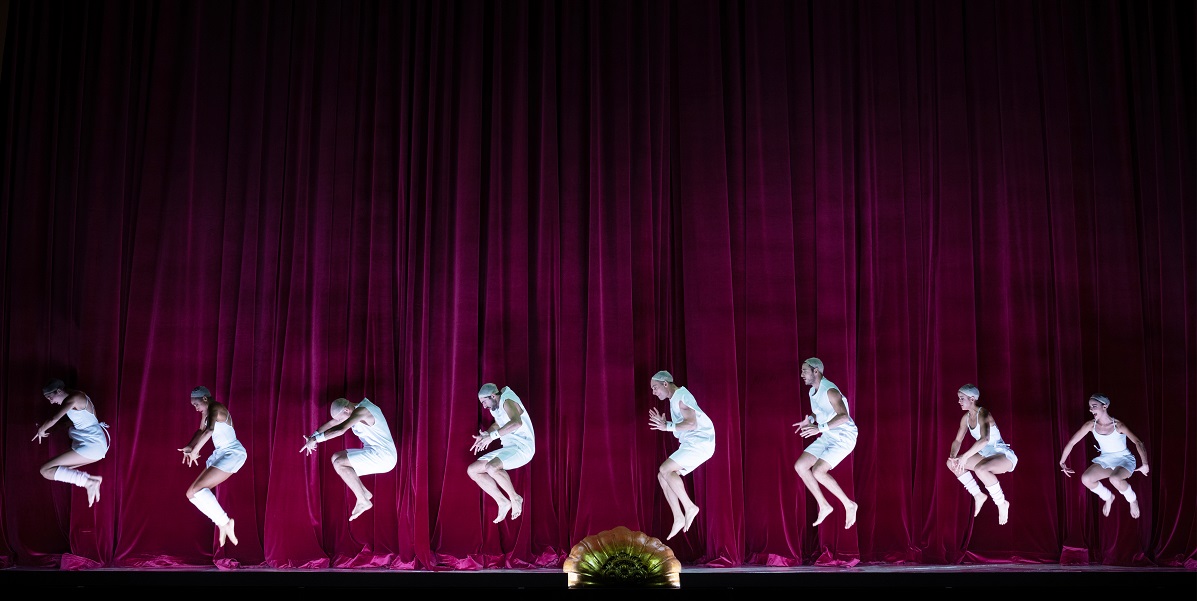
Scene from the “Barkouf” production by Max Hopp at the Zurich Opera House. (Photo: Monika Rittershaus)
The draw was Offenbach. I realized that if I worked it right, I could make a festival out of it and see La Voyage dans le Lune, La Perichole, Orphee, Belle Lurette, and Barkouf (his early attempt at a ‘real’ opera). To add a bit of near-diversity, there was a rare performance of Si J’etais Roi (If I Were King). This 1852 comic opera by Adolphe Adam was done all the time once, but now is really known, if it is known at all, by its overture.
Offenbach undoubtedly would have seen this; it was a huge success in its day.
My trip tied into the annual Donizetti Festival in Bergamo, where they put on the original French version of La Favorite. A snippet from this opera appears in La Perichole (when the chorus taunts Piquillo about his Perichole being the mistress of the Viceroy). Thus, Offenbach pays homage to bel canto, the way he does with his entire piece, Monsieur Choufleri, which is a funny and loving parody of that style of singing.
Visiting Vienna
It wasn’t all Offenbach: A trip to Vienna yielded the premiere of a new production of Die Meistersinger, which was premiered in June of 1868, just weeks before Offenbach’s Perichole. I wanted to see Jonas Kaufmann live, but illness prevented him from singing: he only acted his part in Giordano’s 1896 Andrea Chenier as the actual singer sight-read the score on the side of the stage. Finally, there was a nice performance of the Spanish composer Martin y Soler’s Tree of Diana. Anyone who has seen Don Giovanni has heard a snippet from another work by this composer. There is a nice recording of it on YouTube: you realize how much wonderful music is not heard from the 1780s because Mozart’s genius swept all before it. But when you listen to Diana you can hear an ancestor to operetta, albeit a lesser-known one, like one of your great-great grandparents, or maybe their sister.
In Switzerland one couldn’t resist seeing the French version of Rossini’s William Tell, done at the lovely Bern opera house. It was the full five-act version, and reminded me of the story of Rossini meeting the head of the Paris opera in the street some time after the premier, when the Opera had cut one act after the other:
“You should come tonight Maestro; we are doing Act 2 of your wonderful William Tell.” “What?, the whole act?” Rossini replied.
The day before I went to the small town of Biel/Bienne. It is the world’s largest bi-lingual town, and known best for making Swiss watch components. It has a tiny opera house, which only seats 260. I’d never been in a complete theatre that intimate, and heard Rossini’s first great success, Tancredi.
Encountering Marc Minkowski
Finally, Bellini’s La Sonnambula in Nice’s opening opera season. It was delayed by strike action on the part of the singers, who spent nearly an hour explaining how Nice was not paying them enough. It is an expensive place to live, and France has been cutting back on arts spending, just as the UK has. There was shouting back and forth, with one woman complaining that she had come all the way from Marseilles to see this, and was going to miss her return train. Afterwards it was written that they had some dancers put into the show, in a work which does not have any, and thus could have saved some money that way.
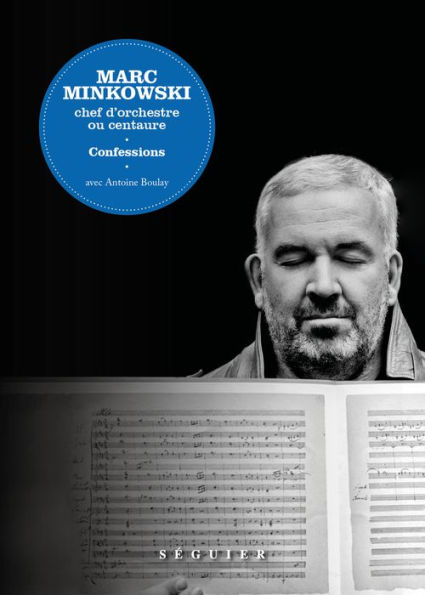
Minkowkis’s book “Marc Minkowski. Chef d’orchestre ou centaure. Confessions”. (Photo: Groupe Robert Laffont)
Let me say right off that the greatest musicianship came from the wonderful conductor Marc Minkowski. He conducted a run of “Pericholes” at the Theatre des Champs Elysees, and stayed afterward to sign his new book. I never knew his mother was American, so it surprised me to hear him speak.
If everyone approached Offenbach the way he does, we’d be spoiled. Sadly, this will be last time he conducts any Offenbach for the foreseeable future. We do have his marvelous recordings, however.
Reviving “Belle Lurette” in English
There was one great revelation: Belle Lurette done in London by the New Sussex Opera. This was Offenbach’s final operetta, written (amazingly) at the same time as Tales of Hoffmann, and both were unfinished. Lurette was completed by Leo Delibes, Offenbach’s young friend now best known for the ballet Coppelia (also from a Hoffmann tale) and the opera Lakme.
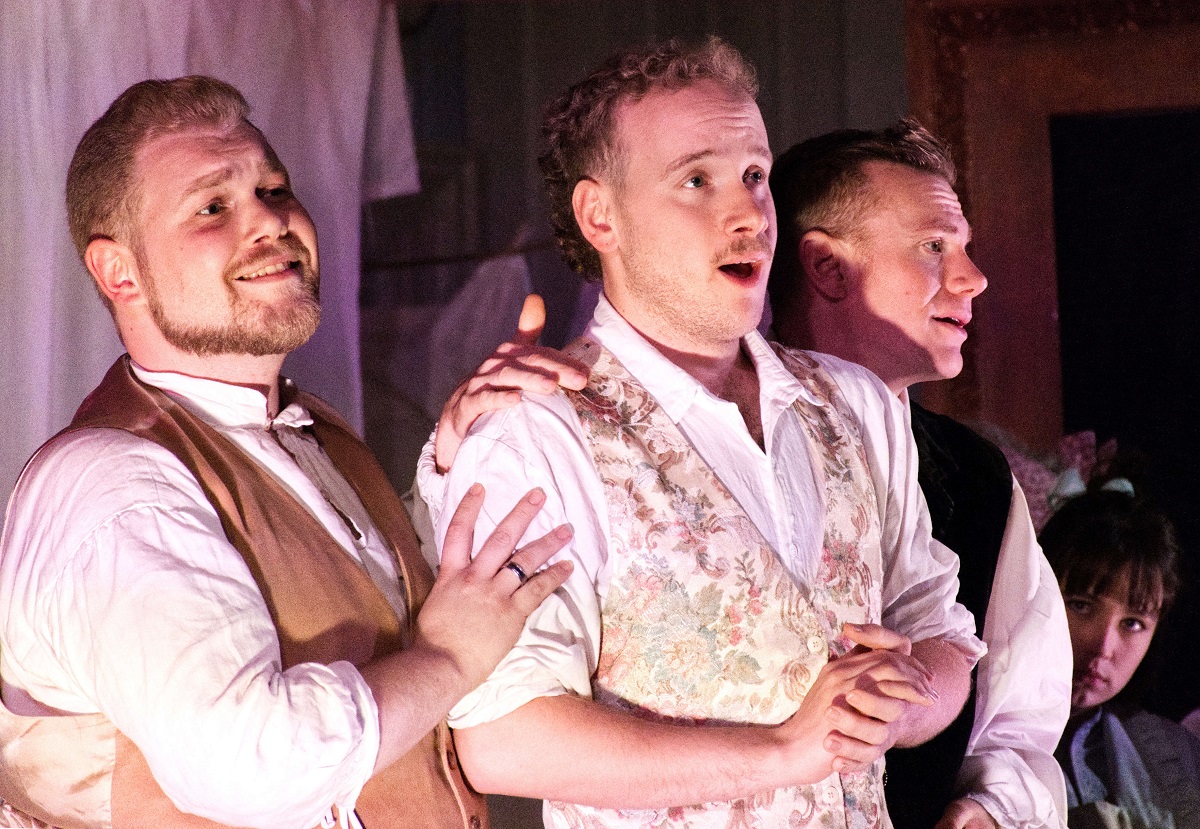
The trio of suitors in “Belle Lurette” at New Sussex Opera. (Photo: Colin Chapman)
The New Sussex Opera company is very much a labor of love. They’ve been performing little-known gems since 1978, with orchestra and chorus. They’ve done three Offenbachs in a row: Belle Helene, and the great but too-little-known Princesse de Trebizonde (a recording of which Opera Rara will release next year).
All of the ninety minute Act 1 of this is plainly by Offenbach, and it is magnificent.
Kevin Clarke is so very correct in his March, 2020 appreciation of this work. The thing is, that being unfinished, no one is sure about how Acts 2 and 3 should sound and look. Musically, it did slow down, and some of it sounded more like Delibes than Offenbach, but that’s probably only to be expected.
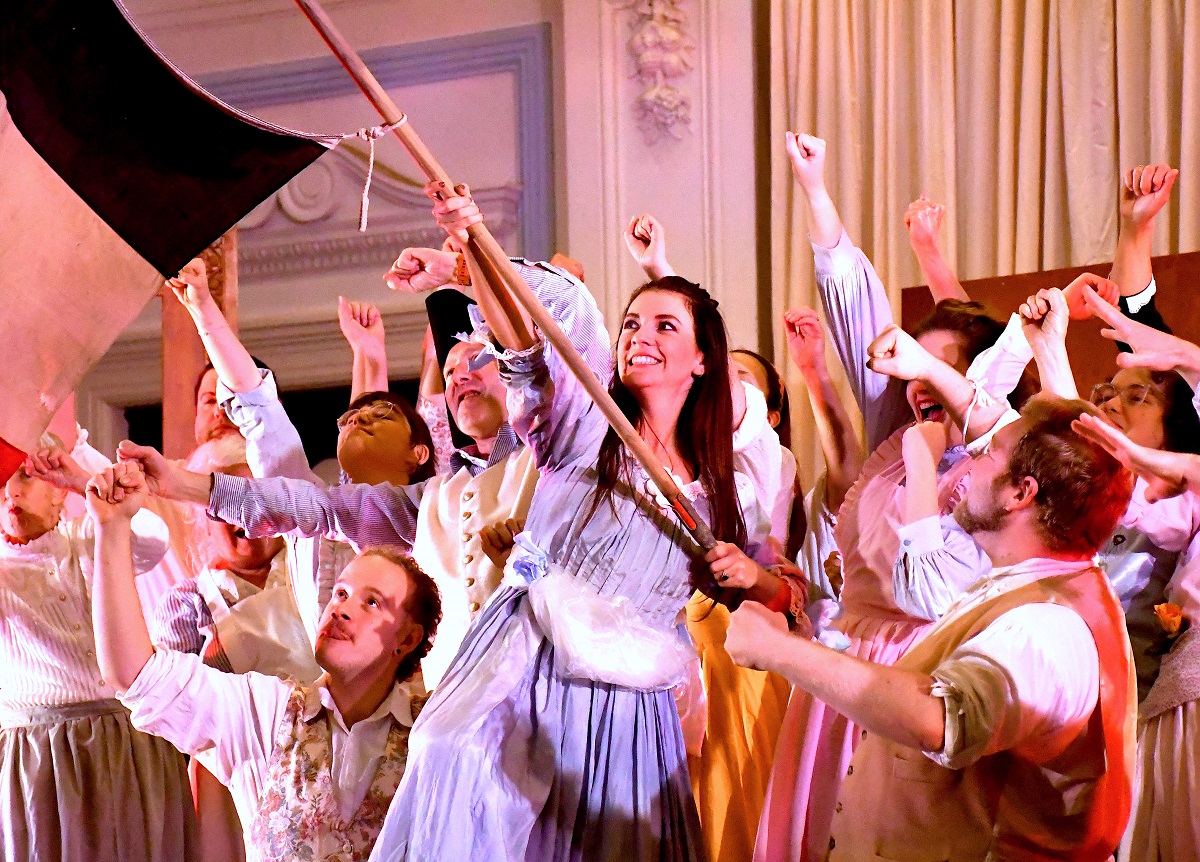
A revolutionary moment in “Belle Lurette” at New Sussex Opera, with the heroine leading the protest against the aristocracy. (Photo: Colin Chapman)
There was a prior review of this show at this website. It was quite good, but John Groves implied that the story was something of a mess. To me, however, everything came together at the end, where all plot lines were resolved.
There is one area where I couldn’t agree more with that reviewer. It was, strange to say, one performer who caught my eye every time she was on stage. She was a minor character, Toinette. She doesn’t have any solos, and yet so vibrant is her stage presence that it was impossible for me to look elsewhere. Her name is Kiera Smitheram, and she embodied the entire spirit of Offenbach.
As the prior reviewer put it, “whenever she appeared, she was always ‘in role’ whilst never taking the focus away from others”. And that is a very hard thing to pull off.
A few nights before in Nice there was a violinist in the orchestra who was lit up by the on-stage action of Orphee. It is weird that I remember both these women so vividly, but both contributed mightily to the enjoyment of both performances.
Back to Lurette: how much I’d love to hear Act One from that Sussex Opera performance. To see it as well would be the very heaven. That the dying Offenbach could write two such wonderful shows as Lurette and Hoffmann is astounding.
One final comment: the company’s Paul Featherstone made the English translation. I wish it could have been heard in full, since the too-few parts I clearly heard sounded very witty. Could it not be published?
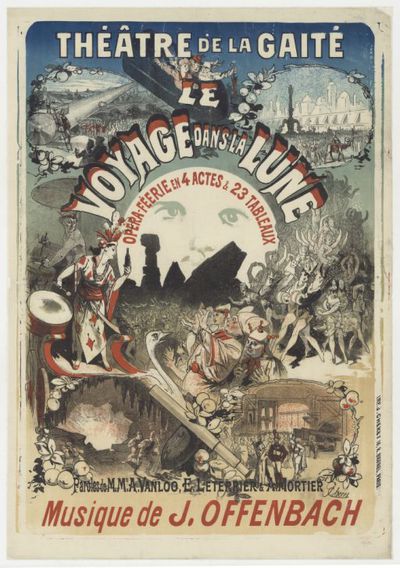
Poster for the “Voyage Dans La Lune” production at the Théâtre de la Gaîté. (Design: Jules Chéret)
Second-place revelation came from Palazzetto Bru Zane’s Le Voyage dans la lune. You still have an opportunity to see this, as it is traveling around France and Switzerland until April (check here for dates). If you are in the area, see it: you won’t be sorry.
What I did took some traveling, but it was worth it. However, I dearly wish that there was a one-stop Offenbach festival where one could see several works (and maybe a related one by another composer thrown in). Rossini has the Pesaro festival, Donizetti has Bergamo, and Wagner has Bayreuth. So why not something for J.O.?
The Grammar for Operetta
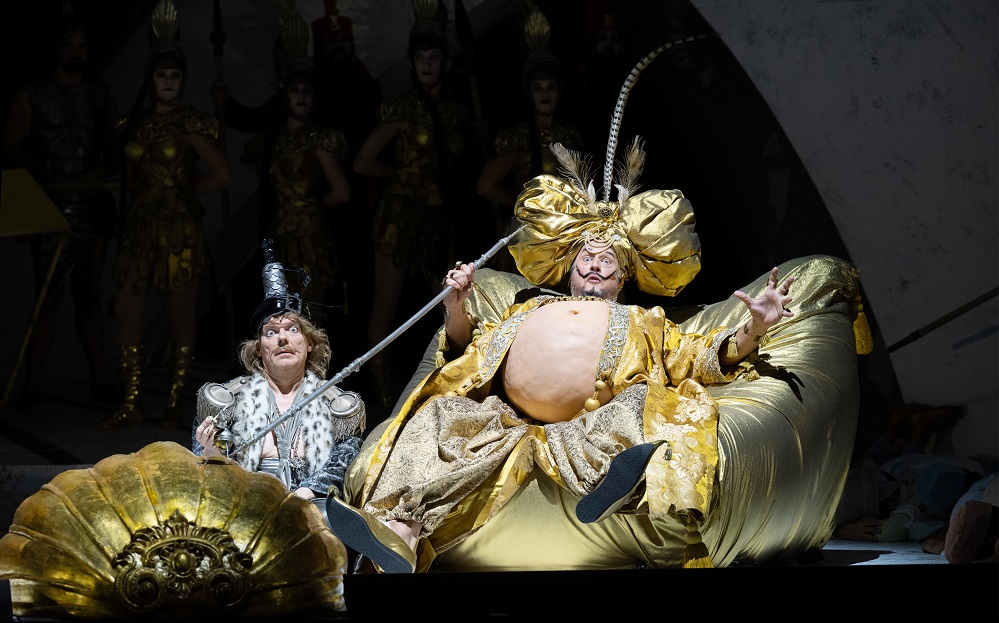
Scene from Offenbach’s “Barkouf” in Zurich, a staging by Max Hopp. Seen here are Marcel Beekman as Bababeck (.l.) and Andreas Hörl as the Grand-Mogul. (Photo: Monika Rittershaus)
PS: I have specifically not written about Barkouf, which is, sad to say, rarely done for a very good reason. It dates from 1860, when O. was still working out the grammar for operetta, much less grand opera. Barkouf is a dog who becomes ruler of a nation, but is killed when his edicts cross those with entrenched power who don’t want to lose it. That sums up the plot, which I’m sure you’ve seen examples of many times before, with maybe a cat instead.
Zurich Opera put a lot into this production. It’s a shame the piece itself is so weak. Just to be sure I wasn’t slighting it needlessly, I went back to see another performance. But no, there is absolutely nothing memorable about this opera.
How I wish that the resources available to Zurich Opera had been given to New Sussex Opera.

Wann gibt es einmal eine Artikel über die Operetten-Aktivitäten des Schauspielers Max Hopp, bekannt u.a. aus dem Usedom-Krimi?
Concerning Belle-Lurette, I think that Offenbach completed almost the whole score (excepted the ouverture and entr’actes) and not only the first act. He died on the 5 october, and the piece was premiered on the 30 october…the vocal score had to be finished to rehearse, and the vast majority of the orchestral score had to be finished to be copied for the musicians.
I totally disagree about Barkouf : is an absolute masterpiece. I was at the premiere in Strasbourg in 2018 (1st time it was played since jan. 1861), and was amazed by the musical language, far more complex that any other works (excepted maybe pieces like Fantasio), and it contains the longest finale of his whole operatic production : the 2nd act finale is almost 40 minutes long.
The social and political satire is really clever and extremely strong (the piece was at first censored for a long time because of that, furthermore Scribe and Boisseaux had to reduce the plot from 4 to 3 acts…).
It was Offenbachs 1st attempt at the Opéra-Comique, which was shot down in flames by critics and the vast majority of the public who didn’t want to have a “little operetta composer” played in an institution like the Opéra-Comique. The public was slightly different at the Opéra-Comique, way more posh than in the Bouffes-Parisiens. He was deeply touched by this fail, and waited until 1867 to compose again for the Opéra-Comique.